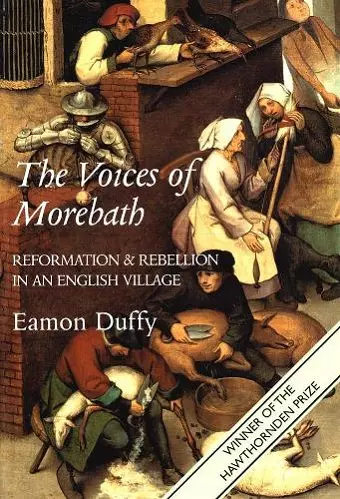The Voices of Morebath
Reformation and Rebellion in an English Village
Format:Paperback
Publisher:Yale University Press
Published:11th Aug '03
Should be back in stock very soon

This title was the winner of the 2002 Hawthornden Prize; it was shortlisted for the Samuel Johnson Prize; and also was shortlisted for the British Academy Book Prize.
In the 50 years between 1530 and 1580, England moved from being a lavishly Catholic country to a Protestant nation. Exploring Morebath, a remote and tiny sheep-farming village on the edge of Exmoor, this work offers a window into a rural world in crisis as the Reformation progressed.In the fifty years between 1530 and 1580, England moved from being one of the most lavishly Catholic countries in Europe to being a Protestant nation, a land of whitewashed churches and antipapal preaching. What was the impact of this religious change in the countryside? And how did country people feel about the revolutionary upheavals that transformed their mental and material worlds under Henry VIII and his three children?
In this book a reformation historian takes us inside the mind and heart of Morebath, a remote and tiny sheep farming village on the southern edge of Exmoor. The bulk of Morebath’s conventional archives have long since vanished. But from 1520 to 1574, through nearly all the drama of the English Reformation, Morebath’s only priest, Sir Christopher Trychay, kept the parish accounts on behalf of the churchwardens. Opinionated, eccentric, and talkative, Sir Christopher filled these vivid scripts for parish meetings with the names and doings of his parishioners. Through his eyes we catch a rare glimpse of the life and pre-Reformation piety of a sixteenth-century English village.
The book also offers a unique window into a rural world in crisis as the Reformation progressed. Sir Christopher Trychay’s accounts provide direct evidence of the motives which drove the hitherto law-abiding West-Country communities to participate in the doomed Prayer-Book Rebellion of 1549 culminating in the siege of Exeter that ended in bloody defeat and a wave of executions. Its church bells confiscated and silenced, Morebath shared in the punishment imposed on all the towns and villages of Devon and Cornwall. Sir Christopher documents the changes in the community, reluctantly Protestant and increasingly preoccupied with the secular demands of the Elizabethan state, the equipping of armies, and the payment of taxes. Morebath’s priest, garrulous to the end of his days, describes a rural world irrevocably altered and enables us to hear the voices of his villagers after four hundred years of silence.
"Stories like the one Duffy skillfully tells here, for historian and general reader alike . . . bear remembering."—Paul Lewis, New York Times Book Review
"Stories like the one Duffy skillfully tells here, for historian and general reader alike . . . bear remembering. And it is a story that can still be seen. . . . Duffy’s map of the parish in Tudor times remains accurate today."—Paul Lewis, New York Times Book Review
"Social history at its most compelling."—Sunday Telegraph
"This is an absorbing portrait of one small Devon village in the sixteenth century as it faced up to daily life and the upheavals of the English Reformation. . . . A series of vivid snapshots of ordinary life during a time of extraordinary change."—The Sunday Times (London)
"Duffy’s scholarship is meticulous and exact. . . . This is a book to be read by enthusiasts and general readers alike. . . . It is vital to understand, for example, that the piety of the people clustered around the saints of the region as if they were an emanation of the soil itself. As more historians begin to discover this territorial imperative, then new forms of history will be written. The Voices of Morebath is a significant and striking example."—Peter Ackroyd, The Times (London)
"Dr. Duffy’s presentation of the journals is quite brilliant. . . . The book is never dull: on the contrary, it reads like a very good novel. . . . This book should be assured of a place in the library of every Catholic school, primary as well as secondary. . . . Not to have read it will reduce one’s claim to be a well-informed English Catholic."—Mentor Magazine
"Gripping. . . . We catch a rare glimpse of the life and pre-Reformation piety of a sixteenth century English village."—Catholic Life (UK)
"Duffy’s meticulous research enables us to catch a rare glimpse of 16th-century religious life as experienced by the poorest of the poor, whose distress at the constant and inexplicable changes wrought by the Reformation comes through clearly in this remarkable and highly praised account."—Good Book Guide (UK)
"[A] vivid piece of microhistory. . . . Through a sensitive and sympathetic reading of this text written to be read out loud to Trychay’s parishioners, Duffy provides us with a rich and often witty portrait."—Alexandra Walsham, History (UK)
"A vivid study. . . . What Duffy gives us is an utterly convincing and compelling work of reconstruction. Other historians have known and used the Morebath accounts, but we have not had this mixture of critical engagement and sheer enthusiasm before. . . . His book is alive with detail and Morebath comes to life in the process. . . . Christopher Trychay and the voices of Morebath are fortunate indeed to have found such a wise and compassionate judge as Eamon Duffy."—David Hoyle, Journal of Theological Studies (UK)
"This book is a gem: small, colourful, many-faceted."—Lucy Wooding, Reviews in History
Short-listed for the Samuel Johnson Prize
Long-listed for the British Academy Book award
Winner of the Hawthornden Prize for Literature for the best work of imaginative literature
ISBN: 9780300098259
Dimensions: unknown
Weight: 408g
248 pages